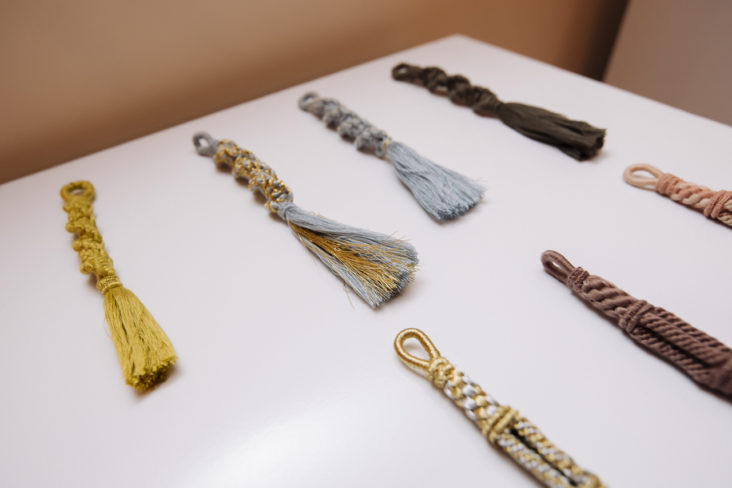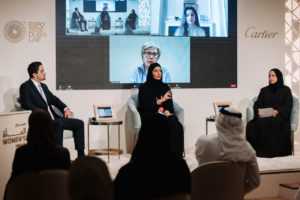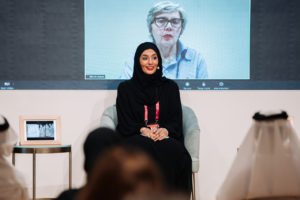Irthi Convenes Global Champions To Teiterate Vital Role Of Sustainability Practices And Documentation For Crafts Preservation

The Irthi Contemporary Crafts Council (Irthi), an affiliate of the UAE-based NAMA Women Advancement Establishment (NAMA), held a vibrant roundtable dialogue yesterday (Tuesday), at Expo 2020 Dubai to reiterate the importance of forging global connections through cross-cultural dialogue centred around the preservation, promotion and modernisation of traditional crafts. The discussion also highlighted the need for the creation of a collective global framework to ensure fair trade and wages for artisan communities everywhere.
The discussion titled ‘The Art of Weaving Connections’, was held at the Women’s Pavilion where NAMA and its three affiliates will have a presence through the six-month event. The roundtable, moderated by Fatima Deemas, Senior Executive – Projects Research Documentation at Irthi, convened a group of respected speakers representing prominent regional and international cultural institutions who have led the preservation and promotion of local crafts and artisans, women’s economic empowerment, and youth training via sustainable crafts practices.
Representing the UAE at the roundtable discussion were HE Reem BinKaram, Director of NAMA who holds leadership roles in fields as diverse as women’s economic empowerment, social development, cultural heritage, youth skills development, and entrepreneurship; and Maywand Jabarkhyl, CEO and Board Member of the Fatima Bint Mohamed Initiative (FBMI), a community development foundation to empower disenfranchised Afghan women by improving their access to healthcare and education, and promoting and preserving arts and culture.
They were joined virtually by Sheikha Bibi Duaij AlJaber Al Sabah from Kuwait, who is an educator, innovator and Chairperson of the AlSadu Society whose career has been dedicated to safeguarding the Kuwaiti textile and weaving heritage for future generations; and, Rosy Greenlees, OBE, from the UK, who is Executive Director of Crafts Council, a national organisation promoting the value of craft and making to society.
Among other key issues, the discussion focused on the importance of preserving and documenting crafts to sustain them for future generations. Attendees also listened to speakers detail the unique programmes, initiatives and collaborations their respective organisations have designed to achieve their goals of enabling crafts to celebrate the diverse expressions of world cultures.
Sustainable practices and documentation highlighted as pillars of crafts preservation
“As a nation, we understand the value of sustainability; it is an integral part of our ancestral history,” noted BinKaram adding that the UAE’s society and economy have been built on the concept. “What we are doing at Irthi now is that we are trying to document this history. The natural dyes we use, for instance, are the same varieties that have been passed down generations. We are not trying to re-invent the wheel; just repackaging traditional dyes, crafts and other elements our heritage in a way that appeals to a younger and a global audience. Crafts documentation is what we lacked in this part of the world, and the efforts of Irthi and similar entities in the region are now filling the gap.”
The NAMA Director also highlighted the efforts of Irthi’s research centre, which has successfully documented 60 different varieties of Talli (handwoven braids) as compared to only 12 that existed before. She added the look books Irthi designed to display the entity’s 2021 Faroukha and Embroidery collection projects was a recent success in their documentation efforts.
For Rosy Greenlees, crafts have several inherent characteristics that promote sustainability. In the UK, for instance, crafts have been inspiring a legion of responsible consumers who “want to know where the materials are coming from, and they want the air miles to be as short as possible which basically means they want to consume locally sourced and made goods.”
“Crafts can address issues of climate change and make people think about the choices they make – look at the flipside of fast fashion, for instance”, she added.
Sheikha Bibi reemphasised Reem BinKaram’s point on sustainability being embedded in GCC societies and noted that AlSadu society is focused on taking Kuwait’s sustainability practices forward in the crafts sector with innovation, research, and artist–artisan collaborations. “We want to go back to being a self-sufficient industry like the old times. What we promote at AlSadu are better spinning facilities, organic dyes, specialisation of roles and create more horizontal power structures.”
Describing sustainability as a journey for FBMI, Maywand Jabarkhyl noted that the organisation took two years to research and put together a model to fit Afghanistan’s context. Describing sustainability as a holistic and practical science with, he said: “Even before we start designing or developing products, we look for target markets and determine whether or not there is demand for them. Our employees too come from challenging circumstances and a fair wage doesn’t address them. The ladies we employed, for instance, could not work at home due to noisy children. So, we perfected our social services plan with education and health care, got together expert leadership to manage the project and measure progress, and more. Sustainability is a full circle, and we need to address every aspect if we want to attain it.”
Irthi launches Faroukha and Embroidery collections 2021–22 at Expo 2020 Dubai
Another key highlight of the session was the official launch of Irthi’s Faroukha and Embroidery look book catalogues featuring their 2021–22 design collections developed in the two local crafts.
Irthi’s artisans from their Bidwa Social Development Programme (Bidwa) have produced over 20 brand new interpretations of the traditional Emirati Faroukha, by fusing the craft’s original weaving and knotting techniques with macramé and contemporary weaves to create a modern design language for the UAE’s Faroukha craft.
The embroidery collection – over 25 contemporary designs of Emirati embroidery fused with Pakistani techniques of Aari and needlework – is the product of a two-year long Skill Exchange Programme that was led by the Bidwa centre. Conceived to ensure the continuity of MENASA crafts, the embroidery collection represents the unique voices of Irthi’s artisans as they elevate traditional designs by grasping its main elements to craft a modern, cross-cultural visual language.
Visit Irthi’s website https://irthi.com/ to browse through and order from Irthi’s Faroukha and Embroidery Collections 2021–22. The entity has been showcasing a curated selection of the Council’s latest craft developments on its recently developed 360-degree ‘Virtual Experience’ platform, which is set against the backdrop of Sharjah’s magnificent desert landscape and celebrates the UAE’s intangible craft heritage.
Being a leading crafts council working to preserve and elevate the crafts of the UAE and the region, Irthi’s new initiatives are a new step forward in ensuring the MENASEA craft’s heritage processes’ continuity in the contemporary fashion and textile markets. These efforts aim to continue training, developing and empowering craftswomen professionally and economically, both regionally and internationally.
With the addition of Faroukha and embroidery, the list of crafts practiced under the Bidwa programme, which includes Talli (handwoven braids) and Safeefah (palm frond weaves) among others, keeps increasing and building on the portfolio and expertise of the artisans.



